Serving 382 students in grades 5-8, Chesapeake Middle School ranks in the bottom 50% of all schools in Ohio for overall test scores (math proficiency is bottom 50%, and reading proficiency is bottom 50%).
The percentage of students achieving proficiency in math is 39% (which is lower than the Ohio state average of 52%). The percentage of students achieving proficiency in reading/language arts is 64% (which is higher than the Ohio state average of 60%).
The student:teacher ratio of 16:1 is lower than the Ohio state level of 17:1.
Minority enrollment is 4% of the student body (majority Hispanic), which is lower than the Ohio state average of 34% (majority Black).
Quick Stats (2025)
- Grades: 5-8
- Enrollment: 382 students
- Student:Teacher Ratio: 16:1
- Minority Enrollment: 4%
- Overall Testing Rank: Bottom 50% in OH
- Math Proficiency: 39% (Btm 50%)
- Reading Proficiency: 64% (Top 50%)
- Science Proficiency: 65-69% (Top 50%)
- Source: National Center for Education Statistics (NCES), OH Dept. of Education
School Overview
Chesapeake Middle School's student population of 382 students has declined by 14% over five school years.
The teacher population of 24 teachers has declined by 7% over five school years.
Grades Offered
Grades 5-8
Total Students
382 students
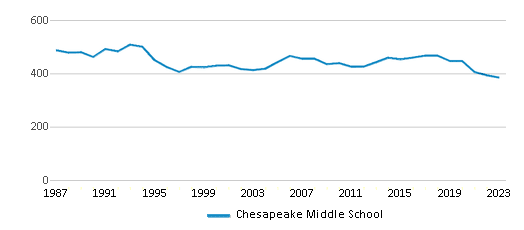
Gender %
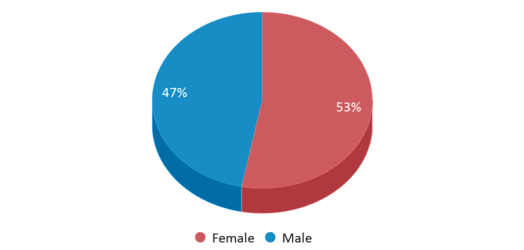
Total Classroom Teachers
24 teachers
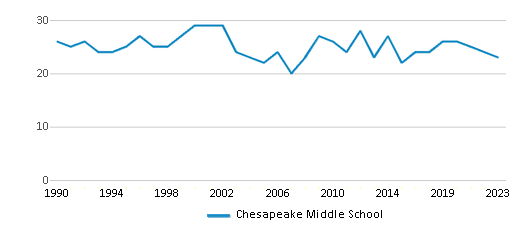
Students by Grade
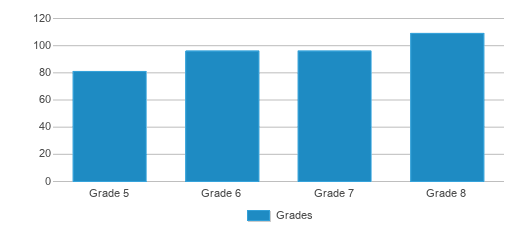
School Rankings
Chesapeake Middle School ranks within the bottom 50% of all 3,241 schools in Ohio (based off of combined math and reading proficiency testing data).
The diversity score of Chesapeake Middle School is 0.08, which is less than the diversity score at state average of 0.53. The school's diversity has stayed relatively flat over five school years.
Overall Testing Rank
#1814 out of 3241 schools
(Bottom 50%)
(Bottom 50%)
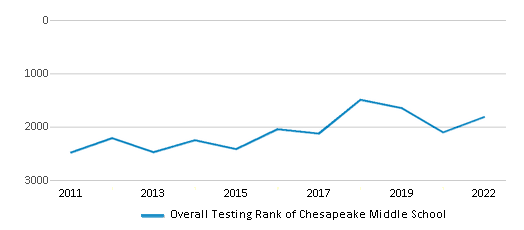
Math Test Scores (% Proficient)
39%
52%
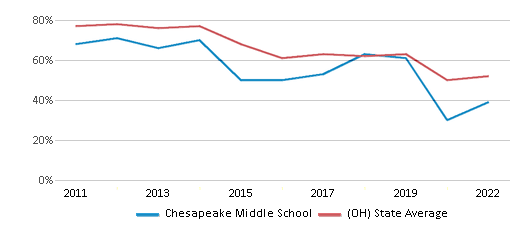
Reading/Language Arts Test Scores (% Proficient)
64%
60%
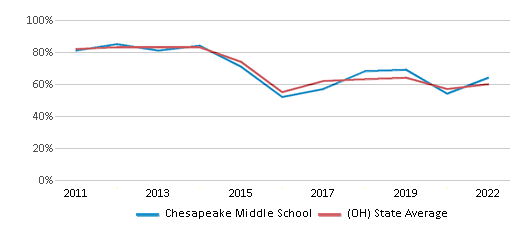
Science Test Scores (% Proficient)
65-69%
63%
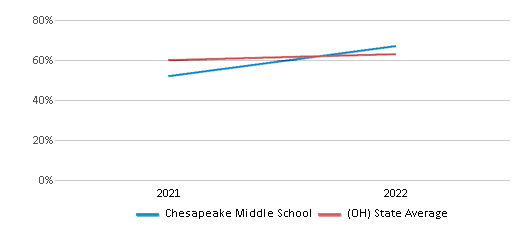
Student : Teacher Ratio
16:1
17:1
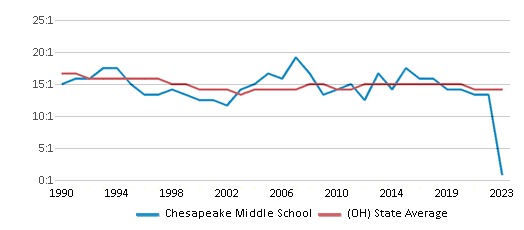
American Indian
n/a
n/a
Asian
n/a
3%
Hispanic
1%
8%
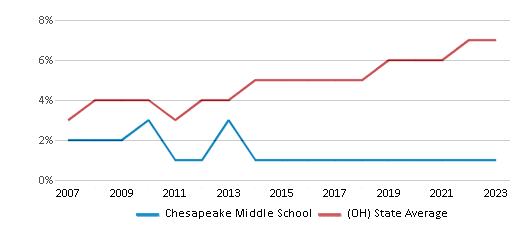
Black
n/a
17%
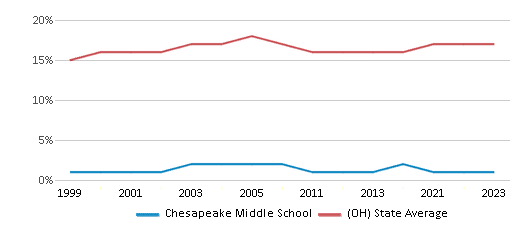
White
96%
66%
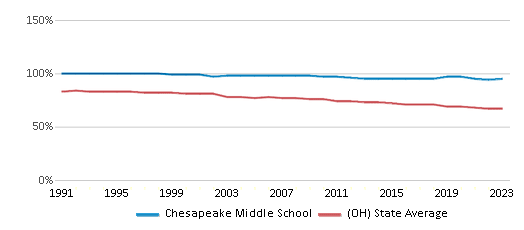
Hawaiian
n/a
n/a
Two or more races
3%
6%
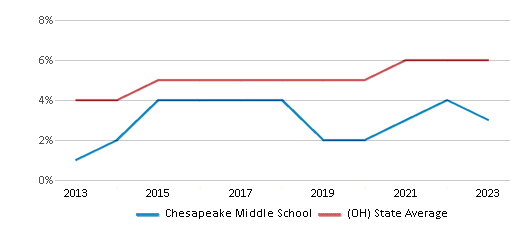
All Ethnic Groups
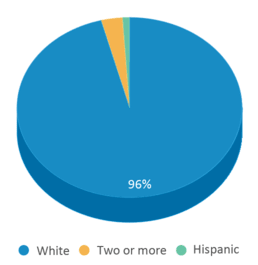
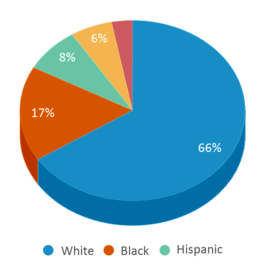
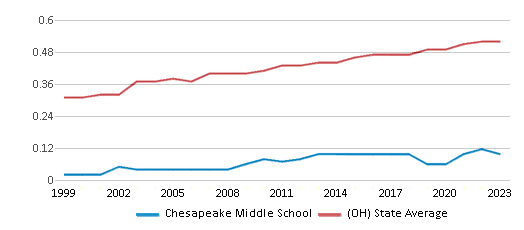
Participates in the National School Lunch Program (NSLP)
Yes
Eligible for Free Lunch
45%
42%
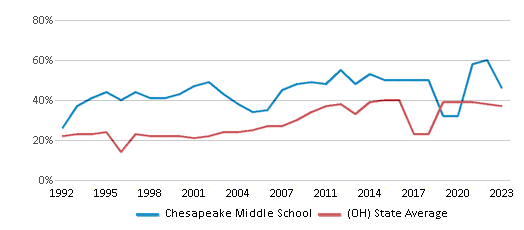
Eligible for Reduced Lunch
11%
5%
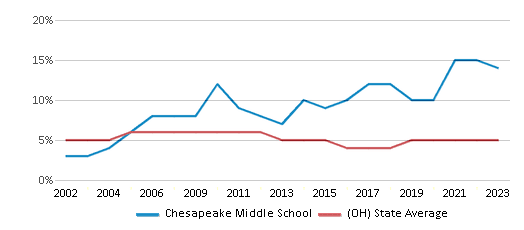
School Statewide Testing
School District Name
Source: National Center for Education Statistics (NCES), OH Dept. of Education
Profile last updated: 02/09/2025
Frequently Asked Questions
What is Chesapeake Middle School's ranking?
Chesapeake Middle School is ranked #1814 out of 3,241 schools, which ranks it among the bottom 50% of public schools in Ohio.
What schools are Chesapeake Middle School often compared to?
Chesapeake Middle Schoolis often viewed alongside schools like Fairland Middle School by visitors of our site.
What percent of students have achieved state testing proficiency in math and reading?
39% of students have achieved math proficiency (compared to the 52% OH state average), while 64% of students have achieved reading proficiency (compared to the 60% OH state average).
How many students attend Chesapeake Middle School?
382 students attend Chesapeake Middle School.
What is the racial composition of the student body?
96% of Chesapeake Middle School students are White, 3% of students are Two or more races, and 1% of students are Hispanic.
What is the student:teacher ratio of Chesapeake Middle School?
Chesapeake Middle School has a student ration of 16:1, which is lower than the Ohio state average of 17:1.
What grades does Chesapeake Middle School offer ?
Chesapeake Middle School offers enrollment in grades 5-8
What school district is Chesapeake Middle School part of?
Chesapeake Middle School is part of Chesapeake Union Exempted Village School District.
School Reviews
5 9/1/2008
Chesapeake Middle is an amazing school. They have many different types of classes to better benefit their students. They also have many extracurricular activities, such as choirs, drama club, and art club. The students are rewarded for their good grades at an academic reception at the end of the year. Sports awards, along with other academic awards are received throughout the school year. Chesapeake has many available facilities and parents are encouraged to be involved with their child's middle school experience. Overall, Chesapeake Middle is a great school.
5 3/9/2007
The staff is friendly and helpful, and the teachers are great. The downside is school fairs are mandatory.
Students should have the option of not competing. This year, officials at the County Fair gave out very few superior awards, and only projects rated as superior were recognized as category winners. Now, the problem is, there was at least one category where no student received a superior rating; therefore, the top student
in that category received only a ribbon and medal. He
was treated the same as students who didn't win. His months of hard work and sacrifice fell by the wayside, and that was wrong. Are we saying the best you can be isn't good enough in Lawrence County schools if you are
not a superior rated student? Students shouldn't be subjected to this type of unfair bias, because few are
superior oriented. Most are just hard working kids who deserve to be treated better than this. Every category should have had a winner, even if the best project only received an excellent rating. Your school should refuse to host school fairs with unfair, biased policies. It does not reflect well on your staff. I was there and saw this happen, and I was appalled. It's hard to watch a child being coldly demoralized. Thank you.
Review Chesapeake Middle School. Reviews should be a few sentences in length. Please include any comments on:
- Quality of academic programs, teachers, and facilities
- Availability of music, art, sports and other extracurricular activities
Recent Articles

What Is A Charter School?
Explore the world of charter schools in this comprehensive guide. Learn about their history, how they operate, and the pros and cons of this educational innovation. Discover key facts about charter schools, including admission policies, demographics, and funding, as well as what to look for when considering a charter school for your child.

10 Reasons Why High School Sports Benefit Students
Discover the 10 compelling reasons why high school sports are beneficial for students. This comprehensive article explores how athletics enhance academic performance, foster personal growth, and develop crucial life skills. From improved fitness and time management to leadership development and community representation, learn why participating in high school sports can be a game-changer for students' overall success and well-being.

February 05, 2025
Understanding the U.S. Department of Education: Structure, Impact, and EvolutionWe explore how the Department of Education shapes American education, from its cabinet-level leadership to its impact on millions of students, written for general audiences seeking clarity on this vital institution.









